The Latest News and Updates
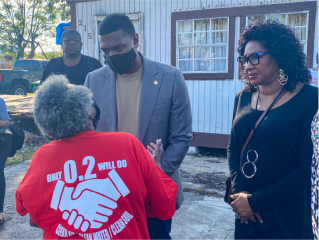
Mar 1, 2023
Statement from the Deep South Center for Environmental Justice on DOJ’s Filing Against Cancer Alley Chemical Plant
Statement from the Deep South Center for Environmental Justice on DOJ’s Filing Against Cancer Alley Chemical Plant FOR IMMEDIATE RELEASE: March 1, 2023 Contact: Ginger LeBlanc | gingerl@dscej.org Valerie Keys | vkeys@skdknick.com NEW ORLEANS, LA – New Orleans, LA -- In response to the Department of Justice’s recent filing against Denka Performance Elastomer, Dr. Beverly Wright, Executive Director of the Deep South Center for Environmental Justice, released the following statement: “When EPA Administrator Michael Regan visited Cancer Alley more than a year ago, he had the opportunity to see firsthand the disproportionate impact these chemical plants have on the majority Black communities in the Mississippi River Chemical Corridor. He made a commitment to hold these industrial polluters accountable and today the U.S. Environmental Protection Agency and the U.S. Department of Justice delivered. For decades Black families have been human experiments for the petrochemical industry in Louisiana, forcing people to choose between leaving a community their family has been a part of for generations or risk illness or even death. While this has certainly been no secret, as we have been fighting alongside community activists for decades, this filing is a major step in helping to correct years of inaction. We look forward to continuing to work with the EPA to ensure that all communities can live and thrive in an environment free of deadly pollution.” ### About the Deep South Center for Environmental Justice Families in the Gulf Coast deserve to live in communities that are free from deadly air and are more resilient to climate change and extreme weather. The Deep South Center for Environmental Justice (DSCEJ) works to empower and engage communities to put environmental justice and equity at the center of all climate action. Led by environmental justice scholar and advocate, author, civic leader and professor of Sociology Dr. Beverly L. Wright, the DSCEJ uses research, education, and community and student engagement to advocate for policy change, lead health and safety training for environmental careers, develop social and emotional community wellness programs, and create new and environmentally healthy opportunities for the residents of communities disproportionately impacted by historic environmental injustice. ...
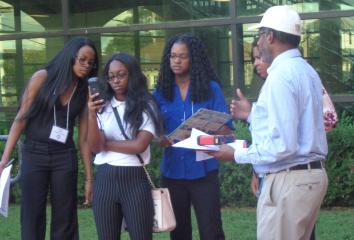
Mar 1, 2023
Now Accepting Applications for the HBCU Environmental Justice And Climate Corps Internship
The Deep South Center for Environmental Justice (DSCEJ) is now accepting applications for the HBCU Environmental Justice and Climate Corps Internship. Five interns representing five Gulf Coast states will immerse themselves in a hands-on research to action project working with a partner community based organization disproportionately impacted by environmental hazards and climate change. The five Gulf Coast communities are New Orleans, LA, Houston, TX, Gulfport, MS, Mobile, AL and Pensacola, FL. DEADLINE: APRIL 7, 2023 For more details and application instructions, please click on the flyer below. ...

Feb 16, 2023
Justice40 Initiative Gaining Momentum as 21 Environmental Justice Hub Leaders from 10 States Convene for Training Institute
Justice40 Initiative Gaining Momentum as 21 Environmental Justice Hub Leaders from 10 States Convene for Training Institute Dr. Beverly Wright of the Deep South Center for Environmental Justice and Dr. Robert D. Bullard of the Bullard Center for Environmental and Climate Justice at Texas Southern University Continue Collaboration to Implement Justice40 Initiative FOR IMMEDIATE RELEASE: February 16, 2023 Contact: Ginger LeBlanc | gingerl@dscej.org Briana Augustus | briana.augustus@tsu.edu NEW ORLEANS, LA – In the coming weeks, Louisiana and Texas are where environmental justice communities will converge to participate in education and research skills training provided by the Deep South Center for Environmental Justice (DSCEJ), led by Dr. Beverly Wright and the Bullard Center for Environmental and Climate Justice at Texas Southern University, led by Dr. Robert D. Bullard. Recently, DSCEJ and the Bullard Center organized 21 Regional Hubs in 10 U.S. states that will be managed by leaders of community-based organizations. Both organizations will continue their collaborative work on the equitable implementation of Justice40 as they convene leaders of the Justice40 Regional Hubs in New Orleans and Houston for education and research skills training. The first 2-day Communiversity training for Regional Hub Leaders will take place February 22 - 24, 2023 in New Orleans, Louisiana at the NOPSI Hotel. The convening will help bolster the capacity of community-based organizations to secure funding for environmental justice projects in their communities. The Communiversity model can help to create a collaborative learning environment that brings together academic researchers, community-based organizations, and residents to address environmental issues in a holistic and equitable way, “The goal of this training is to empower our hub leaders to pursue and advocate for federal dollars that can improve environmental conditions and address climate risks in their communities. For over 30 years, we’ve witnessed projects and funding intended to benefit our communities never reach them. Our Justice40 work has been designed with that history in mind so that our community-based organizations can advocate with authority, equipped with the tools necessary to successfully secure Justice40 mandated funding and resources that will have a lasting impact on their communities.” said Dr. Beverly Wright, Founder & Executive Director of the Deep South Center for Environmental Justice. On March 20-22 on the campus of Texas Southern University in Houston, Texas, leaders will be the first to test the new HBCU Climate and Environmental Justice Screening Tool (HCEJST) that was created to show the disparities in neighborhoods after the Climate & Economic Justice Screening Tool (CEJST) created by the federal government left out race. Leaders will learn how to use the tool and will be responsible for teaching other organizations in their respective communities how to use the tool as well. The Justice40 Initiative, announced 2 years ago, is a part of President Biden’s Executive Order, Tackling the Climate Crisis at Home and Abroad, creating a government-wide initiative with the goal of delivering 40 percent of the overall benefits of relevant federal investments to disadvantaged communities and tracks performance toward that goal through the establishment of an Environmental Justice Scorecard. “To reverse years of environmental racism in our communities, we must make sure that those hit hardest by environmental and economic neglect worsened by the climate crisis have the resources and infrastructure investments necessary to address years of pollution and sickness for its residents,” said Dr. Robert Bullard, founding director of the Bullard Center for Environmental and Climate Justice. “Our supplemental screening tools will address systemic environmental racism head on and ensure communities of color are not left out once again. By working together, we can empower communities to hold government officials and policy makers accountable to the people they serve.” The growing list of Justice40 Hub Leaders are: Susanna Almanza of People Organized in Defense of Earth and Her Resources (PODER) in Austin, TX; Rev. Calvin Avant of Unity in the Family Ministry (UFM) in Pensacola, FL; William Barber, III of Rural Beacon Initiative, LLC of Durham, North Carolina; Rev. James Caldwell of Coalition of Community Organizations (COCO) in Houston, TX; Katherine Egland of Education, Economics, Environmental, Climate and Health Organization (EEECHO) in Gulfport, MS; Rashida Ferdinand of Sankofa in New Orleans, LA; Dawn Hebert of the East New Orleans Neighborhood Advisory Commission in New Orleans, LA; Dr. Nataki Jelks of West Atlanta Watershed Association (WAWA) in Atlanta, GA; Darren Leach of Genesis Church in Columbus, MS; Paulina Lopez of Duwamish River Community Coalition (DRCC) in Seattle, WA; Carolyn Moseley of Eastwick United CDC in Philadelphia, PA; Bridgette Murray of Achieving Community Tasks Successfully (ACTS) in Houston, TX; Għanja O'Flaherty of North Carolina Environmental Justice Network in Rocky Mount, NC; Juan Parras of Texas Environmental Justice Advocacy Services (TEJAS) in Houston, TX; Robert Taylor of Concerned Citizens of St. John (CCSJ) in St. John the Baptist Parish, LA; Angel Torres of Organization for Human Rights and Democracy (OHRD) in Atlanta, GA; Darilyn Turner of Zion Travelers’ Cooperative Center in New Orleans, LA; Debra Walker of Sunnyside Community Redevelopment Organization (SCRO) in Houston, TX; Donele Wilkins of Detroit Green Door Initiative in Detroit, MI; Huey Wilson of Northeast Houston Redevelopment Council (NEHRC) in Houston, Texas; and Joe Womack of Clean, Healthy, Educated, Safe & Sustainable Community (CHESS) in Mobile, AL. ### About the Deep South Center for Environmental Justice Families in the Gulf Coast deserve to live in communities that are free from deadly air and are more resilient to climate change and extreme weather. The Deep South Center for Environmental Justice (DSCEJ) works to empower and engage communities to put environmental justice and equity at the center of all climate action. Led by environmental justice scholar and advocate, author, civic leader and professor of Sociology Dr. Beverly L. Wright, the DSCEJ uses research, education, and community and student engagement to advocate for policy change, lead health and safety training for environmental careers, develop social and emotional community wellness programs, and create new and environmentally healthy opportunities for the residents of communities disproportionately impacted by historic environmental injustice. About the Bullard Center for Environmental and Climate Justice The Robert D. Bullard Center for Environmental and Climate Justice at Texas Southern University was launched to address longstanding issues of systemic inequality and structural racism that cause disproportionate pain, suffering and death in Black and other people of color communities. Texas Southern University is a student-centered comprehensive doctoral university committed to ensuring equality, offering innovative programs that are responsive to its urban setting, and transforming diverse students into lifelong learners, engaged citizens, and creative leaders in their local, national, and global communities. ...

Jan 25, 2023
Deep South Center for Environmental Justice to Attend White House Event Focused on Louisiana
Deep South Center for Environmental Justice to Attend White House Event Focused on Louisiana FOR IMMEDIATE RELEASE: January 25, 2023 Contact: Ginger LeBlanc | gingerl@dscej.org (NEW ORLEANS, LA) - The Deep South Center for Environmental Justice (DSCEJ) accepted the invitation from the Biden-Harris Administration to attend the Communities in Action: Building a Better Louisiana at the White House on January 25, 2023. The goal of this event is to highlight the impact of Biden-Harris programs in communities across Louisiana. Monique Harden, Director of Law and Public Policy/Community Engagement Program Manager, is representing the DSCEJ at this event. "Today's event is an opportunity to share the work we do in collaboration with community-based organizations and HBCUs which has support in the Justice40 Initiative and laws signed by President Biden - the American Rescue Plan, Bipartisan Infrastructure Law, and Inflation Reduction Act," said Dr. Beverly Wright, DSCEJ Founder and Executive Director, who also serves on the White House Environmental Justice Advisory Council. "We are thankful that President Biden has made environmental justice a priority," she said. ### ...

Jan 9, 2023
DSCEJ Statement regarding the US Environmental Protection Agency’s Announcement on Particulate Matter in the Air We Breathe
NEW ORLEANS: Following the EPA's announcement on a proposal to strengthen a key national ambient air quality standard (NAAQS) for fine particle pollution also known as PM2.5, to better protect communities, Dr. Beverly Wright, Founder and Executive Director of the Deep South Center for Environmental Justice (DSCEJ), released the following statement: Black people are exposed to PM2.5 air pollution at a rate that is 1.54 times higher than the population at large. The recent announcement by the EPA on a proposed standard for PM2.5 does not address this racially disproportionate pollution burden, which causes premature deaths and damages the heart and lungs. We need the EPA to follow the science showing public health benefits can be achieved by reducing the annual level of PM2.5 to 8 micrograms per cubic meter. As we near the second anniversary of the Biden Administration’s policy to “deliver environmental justice,” we are encouraged by EPA Administrator Regan’s efforts to ensure that communities whose everyday lives are impacted by pollution are heard. We urge the EPA to hold public hearings on its draft PM2.5 regulation in communities overburdened with pollution, in particular the fine soot particles emitted from smokestacks and tailpipes. The time for debating whether or not to reduce PM2.5 is over. Now is the time for action that sets and enforces a standard protective of environmental justice communities. ...

Dec 13, 2022
Development Director
The Deep South Center for Environmental Justice is seeking a Development Director Position Summary: The Deep South Center for Environmental Justice (DSCEJ) is now hiring an experienced Development Director. Reporting to and in partnership with the Executive Director (ED), the Development Director will spearhead development efforts as DSCEJ continues to grow. The Development Director is a new position in the organization. The incumbent will have the opportunity to build the development function. The successful candidate will help forge new relationships to build DSCEJ visibility, impact, and financial resources. The Development Director will lead the Development Team and is a liaison between the agency and its investors. The Development Director will be responsible for the execution of all grant proposals, submissions,and reports that support agency goals and meet funder guidelines and criteria. This person serves as the primary grant writer, manages funder relationships, engages in compliance reporting, and supports special project initiatives. This position requires strong writing, data analysis, program budgeting, project management skills, with an emphasis on outcome measurement. The Development Director will have primary responsibility for establishing and implementing the infrastructure needed to grow the financial resources of the organization through the solicitation of major gifts, federal and state grants, special events, and corporate and foundation support. The Development Director will expand and diversify DSCEJ’s donor base/pipeline and work closely with other team members to secure funding for new initiatives. In addition, the Development Director will work closely with the board of directors and support board members as they take on a more active fundraising role. . . . READ THE FULL POSITION DESCRIPTION AND APPLICATION INSTRUCTIONS ...

Dec 13, 2022
Contractor - Program Manager Worker Training Program
The Deep South Center for Environmental Justice is seeking A Contractor - Program Manager Worker Training Program (WTP) 4 Month Assignment | January 2 – April 30, 2023 Position Summary: The Deep South Center for Environmental Justice is seeking a highly motivated person who can perform day-to-day administrative duties including trainee management, grant reporting, and data management. The Program Manager Worker Training Program contract position reports to the Assistant Director for Training and Operations and works closely with the Technical Training Director and Training Coordinator. This is not a remote position. The contractor will be required to work at the DSCEJ Office (9801 Lake Forest Blvd, New Orleans, LA 70126) Monday - Friday from 8:00am - 4:00pm throughout the duration of the 4 month assignment. READ THE FULL POSITION DESCRIPTION AND APPLICATION INSTRUCTIONS ...
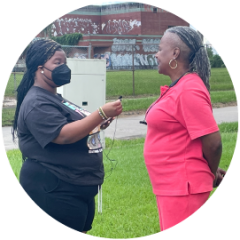
Dec 8, 2022
Louisiana Illuminator: From the Nile to the Mississippi, Petrochemicals are the Next Big Climate Fight Around the World
FOR IMMEDIATE RELEASE: December 7, 2022 Contact: Valerie Keys | vkeys@skdknick.com ICYMI: Louisiana Illuminator: From the Nile to the Mississippi, Petrochemicals are the Next Big Climate Fight Around the World Dr. Wright, Executive Director, Deep South Center for Environmental Justice, Talks The Dangerous Reality of Petrochemicals and The Fight to Stop Its Expansion New Orleans, LA – Dr. Beverly Wright, Executive Director of the Deep South Center for Environmental Justice (DSCEJ) penned an op-ed in the Louisiana Illuminator bringing attention to the dangers petrochemicals pose to those who live near chemical plants. In her piece, From the Nile to the Mississippi, Petrochemicals are the Next Big Climate Fight Around the World, Dr. Wright discussed how the fight against the expansion of petrochemical plants are the next big climate fight our country has to face. By 2050, petrochemical applications will account for nearly half of the growth in oil demand. If unchecked, this rapid expansion of petrochemical production will be devastating to climate progress and public health. The fight to combat the expansion of petrochemicals starts at home, which is why DSCEJ has joined forces to be part of the Beyond Petrochemicals Campaign, Bloomberg Philanthropies’ $85 million effort to stop the expansion of more than 120 petrochemical plants in Louisiana, Texas, and the Ohio River Valley. This partnership is working to foster a prosperous future full of climate progress. See below for excerpts from the op-ed, or read it in the Louisiana Illuminator here. From the Nile to the Mississippi, Petrochemicals are the Next Big Climate Fight Around the World Recently I returned from COP27 in Sharm El Sheik, Egypt where I joined global leaders, advocates, and NGOs who are charting the global path forward on climate. As I met with people from around the world to highlight the importance of environmental justice on a global scale, my thoughts never left the climate fights back at home. Born and raised in New Orleans, I have witnessed the polluting effects of Cancer Alley–an 85-mile stretch of land between Baton Rouge and New Orleans that is home to over 150 petrochemical plants and refineries. For decades, since the 1950’s, it’s been part of our landscape and our shared reality and the effects have been devastating–from corrosive air, and dead birds, to sick relatives and neighbors. Click here to read the full op-ed. ### About the Deep South Center for Environmental Justice Families in the Gulf Coast deserve to live in communities that are free from deadly air and are more resilient to climate change and extreme weather. The Deep South Center for Environmental Justice (DSCEJ) works to empower and engage communities to put environmental justice and equity at the center of all climate action. Led by environmental justice scholar and advocate, author, civic leader and professor of Sociology Dr. Beverly L. Wright, the DSCEJ uses research, education, and community and student engagement to advocate for policy change, lead health and safety training for environmental careers, develop social and emotional community wellness programs, and create new and environmentally healthy opportunities for the residents of communities disproportionately impacted by historic environmental injustice. ...
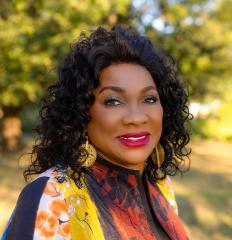
Dec 7, 2022
ICYMI: Dr. Beverly Wright Featured by the National Institute of Environmental Health Sciences as a 2022 Story of Success
FOR IMMEDIATE RELEASE: December 7, 2022 Contact: Valerie Keys | vkeys@skdknick.com ICYMI: Dr. Beverly Wright Featured by the National Institute of Environmental Health Sciences as a 2022 Story of Success NIEHS’s Stories of Success Showcase Grantees Who are Performing Ground-Breaking Work New Orleans, LA – Dr. Beverly Wright, Executive Director of the Deep South Center for Environmental Justice (DSCEJ) was recently featured as NIEHS’s latest Story of Success, a line-up of NIEHS grantees who are developing new technologies to better measure environmental exposures and their effects on our body; partnering with communities to help them understand the effects of pollution, and cultivating tomorrow's environmental health scientists. The post highlights Dr. Wright’s career addressing environmental and health inequities for communities in the Gulf Coast Region of the U.S. From her experience growing up close to the Mississippi River Chemical Corridor to her days performing research as a doctorate student, her experiences have led her to be a leading voice in the U.S. environmental justice movement. See below for excerpts from the post, or read it on the NIEHS’s website here. “As a child, I remember everyone called the stench from the chemical plants, ‘the smell of progress’,” Wright said. “But fast forward decades later, what the community thought was helping them financially, was killing us – some faster than others.” Later while pursuing her doctorate in sociology, Wright noted that low-income groups and people of color faced significant risks to environmental threats. These risks were often compounded by pollution in their neighborhoods and other hazards in their homes and workplaces. Today, Wright directs activities of the DSCEJ and partners with others in academia, communities, churches, local governments, and nonprofit organizations to address the long legacy of environmental pollution, climate change, and health disparities that impact communities in Louisiana and other Gulf states. Click here to see Dr. Wright's full story. ### About the Deep South Center for Environmental Justice Families in the Gulf Coast deserve to live in communities that are free from deadly air and are more resilient to climate change and extreme weather. The Deep South Center for Environmental Justice (DSCEJ) works to empower and engage communities to put environmental justice and equity at the center of all climate action. Led by environmental justice scholar and advocate, author, civic leader and professor of Sociology Dr. Beverly L. Wright, the DSCEJ uses research, education, and community and student engagement to advocate for policy change, lead health and safety training for environmental careers, develop social and emotional community wellness programs, and create new and environmentally healthy opportunities for the residents of communities disproportionately impacted by historic environmental injustice. ...
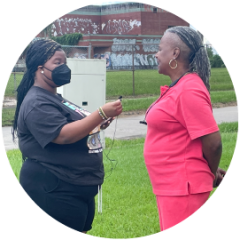
Dec 2, 2022
The Next Generation of Environmental Justice Leaders Tour Cancer Alley
A fenceline community in Cancer Alley. Four New Orleans high school students participating in the Deep South Center for Environmental Justice’s (DSCEJ) Environmental and Climate Justice Storyteller (ECJS) internship program completed a tour of Cancer Alley, an 85-mile stretch of land along the Mississippi River between Baton Rouge and New Orleans that is home to over 150 petrochemical plants and refineries. ECJS Interns, Langston Bishop, St. Augustine High School, Lael Tolbert, Mount Carmel High School, Re’Kal Hooker, The Living School, and Victoria Cager, New Orleans Center for Creative Arts met with community leaders throughout the corridor to learn more about the environmental injustices that have been occurring for decades in their own backyard. Concerned Citizens of Gordon Plaza New Orleans, LA New Orleans ECJS Intern Re’Kal Hooker interviews Gordon Plaza Community Leader, Shannon Rainey The students kicked off the Cancer Alley Tour in in the Gordon Plaza Community of New Orleans, LA, which sits on top of a municipal landfill. For forty years, residents in Gordon Plaza have complained of exposure to toxic waste in their yards, pipes corroding underneath their homes, and high rates of cancer in their community. Re’Kal Hooker interviewed community leader Shannon Rainey about her experience living in Gordon Plaza. Ms. Rainey spoke about the challenges she has experienced living in her community, such as seeing friends and neighbors succumb to cancer due to exposure to toxins in the soil. Although residents in this community have spent years in court fighting for relocation, many are hopeful that things may be different this time. Ms. Rainey said that “they are currently negotiating with the City of New Orleans for a fully funded relocation of residents living in Gordon Plaza.” She is hopeful and looks forward to a victory for the Gordon Plaza Community soon. Citizens of St. John the Baptist Parish Reserve, LA New Orleans ECJS Intern, Landon Bishop interviews St. John the Baptist Parish Community Leader, Robert Taylor. The next stop on the Cancer Alley Tour was St. John The Baptist Parish in Reserve, LA, where the students met with community leader and President of Concerned Citizens of St. John the Baptist Parish Robert Taylor. During his interview conducted by Langston Bishop, we learned that Mr. Taylor started Concerned Citizens of St. John the Baptist Parish in 2016 after his wife became ill from exposure to toxic chemicals coming from the nearby Denka/Dupont Plant. “The odors from the plant caused my wife to become extremely ill,” said Mr. Taylor. “After this incident, I reached out to the Environmental Protection Agency, Louisiana Department of Environmental Quality, and St. John Parish Homeland Security. I also reached out to local representatives from St. John the Baptist Parish and the local school board for help. The Fifth Ward Elementary School is only 1500 feet from Denka/Dupont.” Mr. Taylor shared with Bishop that “Denka emits chloroprene levels over 400 times the Environmental Protection Agency safety standard for long term exposure,” which is why “it’s hard to find a family in Reserve, LA who hasn’t been touched by cancer.” As a senior in his 80’s, Mr. Taylor’s advice to the next generation is to continue the fight for environmental justice with great allies. “Unity is the key to fighting industry,” he said. Rise St. James St. James Parish ECJS Team Leaders and New Orleans Interns from left to right: Landon Bishop, St. Augustine High School, Re’Kal Hooker, The Living School, Dr. John Warford, DSCEJ, Victoria Cager, New Orleans Center for Creative Arts, Dr. Deb Morrison, CLEAR Environmental, Sharon Lavigne, RISE St. James, and Mary I. Williams, DSCEJ The final stop was in St. James Parish, where Victoria Cager had the distinct honor of interviewing Sharon Lavigne, the 2021 Goldman Environmental Award recipient and President of Rise St. James. In 2018, Ms. Sharon Lavigne smelled odors in the air and began work with the Help Association. Over the last four years, Rise St. James has prevented plants from coming to St. James Parish. Ms. Lavigne said, “the local officials don’t represent the community, they represent the industries. They have let us down.” Rise St. James has hosted town hall meetings and distributed flyers to raise awareness about plants coming into their community. Unfortunately, residential homes, the sugar mill, and St. James High School were sold to industry. There are twelve plants on the West Bank and seven plants on the East Bank of St. James Parish. Additionally, Lavigne built storage plants next to homes in the community. As a result of the long-term exposure to toxic chemicals and high cancer rate in her community, Ms. Lavigne encourages the next generation to get their education and do their research so that they can come back to St. James Parish with ways to help their community. She would also like the federal government to declare a public health emergency in St. James Parish. ECJS Interns look forward to continuing their work with these communities as they develop creative ways to chronicle their story as they demand the right to clean air, water, and soil for all. About the Environmental and Climate Justice Storyteller Internship program ECJS is a program funded by the National Academy of Sciences, Engineering and Medicine (NASEM). The $1.25 million, five-year grant awarded to the Deep South Center for Environmental Justice (DSCEJ) is dedicated to equipping the next generation of environmental and climate justice leaders with the technical skills to chronical the stories of marginalized communities along the Gulf Coast Region in LA, FL, MS, AL, and TX. ...